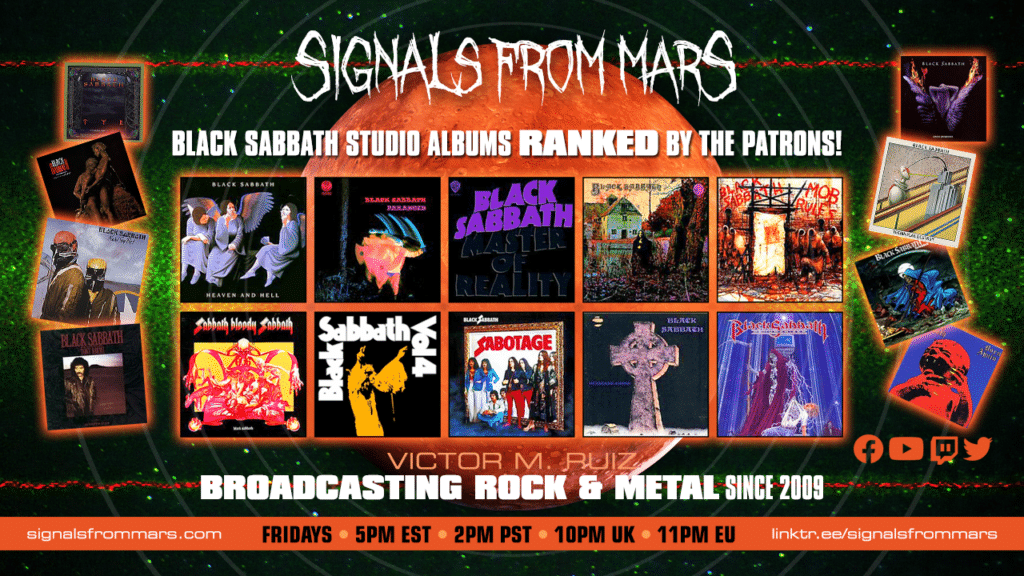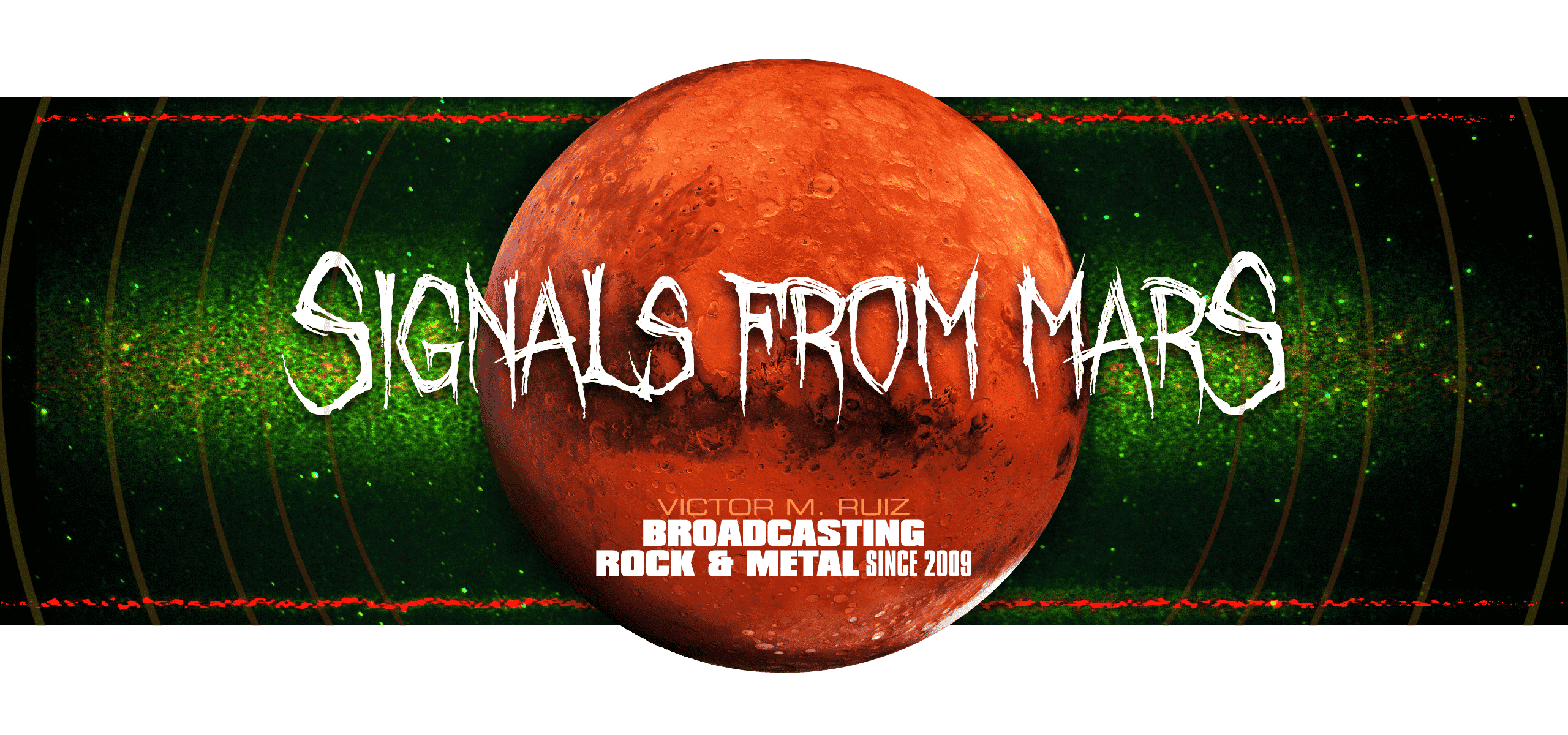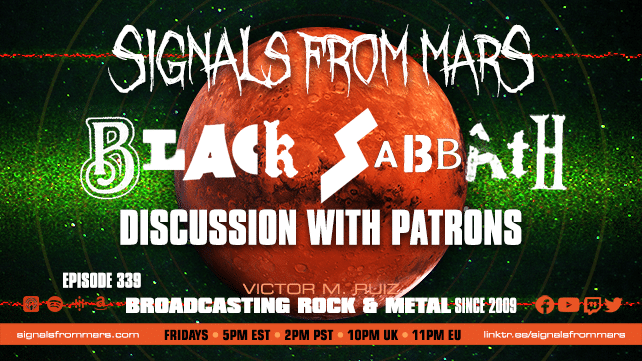SIGNALS FROM MARS | BLACK SABBATH DISCUSSION
During this episode of Signals From Mars, my Patrons join me to discuss the discography of Black Sabbath.
The way this works is Patrons submit a list of their top 10 favorite albums by Black Sabbath. Each album is assigned a set of points. Number one gets 10 points, number two gets 9 points all the way down to their number ten which receives 1 point. I sum all of the points up and whichever album comes out with the most points ends up as number one.
They also picked a track to represent each album. We also created an Ultimate Black Sabbath Playlist based on their selections.
Did your favorite make the list? Should it have ranked higher? What’s that album even doing on the list?
STREAM OR DOWNLOAD THE EPISODE FROM HERE:
CHECK OUT THE VIDEO VERSION OF THE EPISODE HERE:
| 1 | Heaven And Hell |
| 2 | Paranoid |
| 3 | Master Of Reality |
| 4 | Black Sabbath |
| 5 | Mob Rules |
| 6 | Sabbath Bloody Sabbath |
| 7 | Vol. 4 |
| 8 | Sabotage |
| 9 | Headless Cross |
| 10 | Dehumanizer |
| 11 | Technical Ecstasy |
| 12 | 13 |
| 13 | Cross Purposes |
| 14 | Born Again |
| 15 | Never Say Die! |
| 16 | The Eternal Idol |
| 17 | Seventh Star |
| 18 | Tyr |
| 19 | The Devil You Know |
| 20 | Forbidden |

BLACK SABBATH | THEIR INFLUENCE
Black Sabbath is a pioneering heavy metal band that formed in Birmingham, England in 1968. The original lineup included guitarist Tony Iommi, bassist Geezer Butler, drummer Bill Ward, and vocalist Ozzy Osbourne.
The band is widely regarded as one of the most important and influential groups in the history of heavy metal. Their music often featured dark, foreboding themes and heavy, down-tuned riffs that helped to define the genre.
Some of their most famous songs include “Iron Man,” “War Pigs,” and “Paranoid.” Black Sabbath released their self-titled debut album in 1970, which is often cited as the first true heavy metal album.
Over the years, the band went through a number of lineup changes, with Ozzy Osbourne being replaced by Ronnie James Dio, then by Ian Gillan, and later by Tony Martin. They also experimented with different styles and sounds, incorporating elements of progressive rock, hard rock, and even disco.
Black Sabbath officially retired in 2017 after a farewell tour, but their legacy as pioneers of heavy metal music continues to live on.
BLACK SABBATH | OZZY OSBOURNE
Ozzy Osbourne’s contribution to Black Sabbath cannot be overstated. As the band’s original lead vocalist, Osbourne helped to define the sound and style of heavy metal music in the 1970s.
Osbourne’s distinctive vocals, which ranged from melodic and haunting to raw and aggressive, gave Black Sabbath’s music a sense of urgency and intensity that was unprecedented at the time. His lyrics, which often explored themes of darkness, death, and the occult, helped to establish the band as a pioneer of the heavy metal genre.
Black Sabbath’s early albums, such as their self-titled debut and “Paranoid,” which both featured Osbourne on vocals, are considered classics of the genre and continue to influence heavy metal bands to this day. The band’s heavy, down-tuned riffs and dark, brooding melodies served as a blueprint for generations of metal musicians.
In addition to his contributions as a vocalist, Osbourne also played a key role in shaping Black Sabbath’s image and live performances. His wild stage presence, which included biting the head off a bat and other outrageous stunts, helped to cement the band’s reputation as one of the most dangerous and exciting live acts in rock music.
Although Osbourne left Black Sabbath in 1979 to pursue a successful solo career, his legacy as the band’s original frontman continues to loom large in the world of heavy metal music.
BLACK SABBATH | RONNIE JAMES DIO
Ronnie James Dio joined Black Sabbath as their lead vocalist in 1979, replacing Ozzy Osbourne who had left the band. Dio’s arrival ushered in a new era for the band, marked by a more polished sound and a focus on epic, fantasy-inspired lyrics.
Dio’s first album with the band, “Heaven and Hell,” was released in 1980 and is often cited as one of Black Sabbath’s best albums. It featured the hit single “Neon Knights” and showcased Dio’s powerful vocals and Iommi’s signature guitar riffs.
The band’s next album, “Mob Rules,” was released in 1981 and continued in the same vein as “Heaven and Hell,” with Dio’s lyrics exploring themes of magic and mysticism. The album included the popular tracks “Turn Up the Night” and “The Mob Rules.”
In 1982, Dio left Black Sabbath to pursue a solo career, but he returned to the band briefly in the early 1990s. During his time with Black Sabbath, Dio helped to establish the band as one of the premier heavy metal acts of the era and left an indelible mark on the genre with his distinctive vocals and songwriting.
BLACK SABBATH | TONY MARTIN
Tony Martin joined Black Sabbath in 1987, replacing lead vocalist Ray Gillen, who had briefly replaced Glenn Hughes. Martin’s arrival marked a return to a more traditional heavy metal sound for the band, with his powerful vocals and the band’s focus on heavy guitar riffs.
Martin’s first album with the band, The Eternal Idol, was released in 1987 and showcased his vocal range and the band’s ability to write powerful, anthemic metal songs. The album featured the singles “The Shining” and “Born to Lose.”
Martin continued to work with Black Sabbath throughout the late 1980s and early 1990s, releasing albums such as Headless Cross (1989), Tyr (1990), and Cross Purposes (1994). These albums were generally well-received by fans and critics, with Martin’s vocals and the band’s heavy, guitar-driven sound serving as highlights.
Despite the success of these albums, Black Sabbath’s popularity began to decline in the mid-1990s, and the band went through a number of lineup changes before ultimately disbanding in 2006. Tony Martin’s contributions to Black Sabbath helped to keep the band relevant during a difficult period in their history and solidified his status as one of the most talented and underrated vocalists in the heavy metal genre.
BLACK SABBATH | TONY IOMMI
Tony Iommi is one of the most important figures in the history of heavy metal music. As the lead guitarist and a founding member of Black Sabbath, he helped to create the distinctive sound and style of heavy metal that has influenced generations of musicians.
Iommi’s guitar playing is characterized by his use of heavy, down-tuned riffs, dark and brooding melodies, and blistering solos. His guitar tone, which was achieved by tuning his guitar down several semitones and using thick, heavy-gauge strings, helped to define the sound of heavy metal and remains a cornerstone of the genre to this day.
In addition to his technical prowess as a guitarist, Iommi is also a prolific songwriter and has written many of Black Sabbath’s most iconic and influential songs. His ability to craft powerful and memorable riffs and melodies, often with a focus on dark and ominous themes, has earned him a place among the most celebrated songwriters in rock music history.
Beyond his contributions to Black Sabbath, Iommi has also worked as a solo artist and collaborated with a wide range of musicians from different genres. His influence can be heard in the music of countless heavy metal bands, as well as in other genres such as grunge, stoner rock, and doom metal.
In recognition of his immense contributions to the world of music, Iommi has been honored with numerous awards and accolades, including induction into the Rock and Roll Hall of Fame as a member of Black Sabbath.
BLACK SABBATH | BILL WARD
Bill Ward is a drummer and a founding member of the legendary heavy metal band Black Sabbath. Alongside guitarist Tony Iommi, bassist Geezer Butler, and vocalist Ozzy Osbourne, Ward helped to create the band’s iconic sound and style, which would go on to influence generations of heavy metal musicians.
Ward’s drumming style is characterized by his use of powerful and thunderous rhythms, often accompanied by intricate and precise fills and flourishes. His playing was a key component of Black Sabbath’s sound, helping to create the band’s trademark heavy, doom-laden sound.
In addition to his contributions to Black Sabbath, Ward has also worked as a solo artist and collaborated with a wide range of other musicians. He is known for his versatile playing style, which has allowed him to work in a variety of musical genres, from jazz to blues to hard rock.
Throughout his career, Ward has been recognized as one of the most influential drummers in rock music history. His innovative playing style, combined with his technical proficiency and musical creativity, have earned him a place among the most celebrated drummers of all time.
Despite some periods of absence and conflicts with the band over the years, Ward remains an integral part of Black Sabbath’s legacy and his contributions to the band’s music continue to be celebrated by fans and musicians alike.
BLACK SABBATH | GEEZER BUTLER
Geezer Butler is a bassist and a founding member of the legendary heavy metal band Black Sabbath. Alongside guitarist Tony Iommi, drummer Bill Ward, and vocalist Ozzy Osbourne, Butler helped to create the band’s iconic sound and style, which would go on to influence generations of heavy metal musicians.
Butler’s bass playing is characterized by his use of heavy, distorted tones, complex rhythms, and melodic lines. His playing style helped to define the sound of Black Sabbath and has influenced countless bassists in the heavy metal genre and beyond.
In addition to his contributions to Black Sabbath, Butler has also worked as a solo artist and collaborated with a wide range of other musicians. He is known for his lyrical and poetic songwriting style, often tackling dark and introspective themes in his music.
Throughout his career, Butler has been recognized as one of the most influential bassists in rock music history. His innovative playing style, combined with his songwriting skills and musical creativity, have earned him a place among the most celebrated musicians of all time.
Butler’s legacy as a musician is further cemented by his role in helping to shape the sound and style of heavy metal, and his contributions to Black Sabbath’s music continue to be celebrated by fans and musicians alike.
BLACK SABBATH | OTHER MUSICIANS
Black Sabbath went through several short-lived vocalists over the years, including:
Dave Walker (1977) – Walker joined Black Sabbath briefly after the departure of Ozzy Osbourne but left the band before recording any albums. He later joined the band Fleetwood Mac.
Ray Gillen (1986) – Gillen joined Black Sabbath after the departure of Glenn Hughes but was quickly replaced by Tony Martin. He later went on to form the band Badlands.
Ian Gillan (1983) – Gillan, best known as the lead vocalist of Deep Purple, joined Black Sabbath for one album, Born Again. Although the album was a commercial success, Gillan’s tenure in the band was short-lived, and he left soon after its release.
Despite the short-lived nature of these vocalists’ time in Black Sabbath, their contributions to the band’s music and legacy should not be overlooked. Each of them brought their own unique style and sound to the band, and their brief tenures helped to shape the band’s history in their own way.
Black Sabbath has had several drummers over the years, in addition to founding member Bill Ward. Here are some of the most notable drummers who have played with the band:
Vinny Appice: Appice joined Black Sabbath in 1980, after the departure of Bill Ward. He played on the albums Mob Rules and Live Evil and is known for his powerful, hard-hitting style of drumming.
Bev Bevan: Bevan joined Black Sabbath in 1983 and played on the Born Again album tour. He had previously been the drummer for the band ELO and brought a more upbeat and pop-oriented style to Black Sabbath’s music.
Eric Singer: Singer played drums for Black Sabbath on their 1987 album The Eternal Idol. He has also played with other iconic bands such as Kiss and Alice Cooper, and is known for his technical proficiency and versatility as a drummer.
Cozy Powell: Powell played with Black Sabbath on their albums Headless Cross, Tyr, and Forbidden. He had previously played with bands such as Rainbow and Whitesnake, and is known for his powerful and precise drumming style.
While these drummers have made important contributions to Black Sabbath’s music, Bill Ward’s playing remains synonymous with the band’s iconic sound and is often considered to be an integral part of their legacy.
While Geezer Butler is the most well-known and iconic bassist of Black Sabbath, the band has had a few other bassists throughout their history. Here are some of the bass players who have played with Black Sabbath:
Dave Spitz: Spitz played bass for Black Sabbath on their 1986 album The Seventh Star. He had previously played with the band Great White, and is known for his heavy, driving bass lines.
Jo Burt: Burt played bass on Black Sabbath’s The Eternal Idol album tour. He had previously played with the band Virginia Wolf, and brought a more melodic and pop-oriented style to Black Sabbath’s music.
Neil Murray: Murray played bass on Black Sabbath’s 1990 album Tyr and 1995 album Forbidden. He had previously played with the band Whitesnake, and is known for his versatile and technically proficient playing style.
Bob Daisley: Daisley played bass on Black Sabbath’s 1987 album The Eternal Idol. He had previously played with bands such as Rainbow and Ozzy Osbourne’s solo band, and is known for his precise and melodic bass lines.
While these bass players have all made important contributions to Black Sabbath’s music, Geezer Butler’s playing style and songwriting contributions are widely considered to be an essential part of the band’s sound and legacy.
Join us live for Signals From Mars. Ask questions, talk to others, and partake!
Fridays 5 PM EST / 2 PM PST / 10 PM UK / 11 PM CET on several platforms including Facebook, YouTube, Twitter, Twitch, and more.
What podcast to listen to? Signals From Mars has been around since 2009. Since then, it has been one of the go-to shows for honest hard rock and metal interviews and discussions. Want to subscribe? Go here to subscribe to Signals From Mars Live Stream & Podcast.
FRIDAYS ON SIGNALS FROM MARS
Check out Signals From Mars Livestream Fridays at 5:00 PM EST / 2:00 PM PST / 10:00 PM in the UK / 11:00 PM CET.
The show broadcasts simultaneously on several different platforms. You can watch on Facebook, YouTube, Twitch, and Twitter.
Alternately, the podcast version of the Livestream will be available next week.
If you haven’t already subscribed to the podcast, it is available on all of the major podcasting platforms.
TUESDAYS ON SIGNALS FROM MARS
Signals From Mars Trivia Tuesday on Twitch is a weekly live show where I throw out a bunch of hard rock and metal trivia questions to the audience.
Not only do you need to know the correct answer, but you also need to be the quickest to answer correctly. The faster you answer, the more points you obtain. But answer wrong, and you’ll lose points.
Want to join in on the action, watch and hang out in the chat? Go here to do so.
Signals From Mars Trivia Tuesday 6 PM EST / 3 PM PST / 11 PM UK / 12 AM Wednesday CET
BECOME A PATRON
You’ll get exclusive Podcasts, daily video content, shout-outs, and merch depending on the tier you pick. You’ll also have the ability to get involved in the Hour One shows, and monthly Patron discussions.
Don’t wait for shows to do their quarterly or monthly specials on new music. You’ll find new music daily on the Patreon page.
Everyone’s opinion is respected in the group. And if you don’t like a track that’s featured, don’t where there is plenty more new music coming.
Join the Patrons for our monthly discussions. Have your voice heard!
Yes, of course, you can. You can make a one-time PayPal donation, Buy Me A Pizza, buy some merch, or use one of the Amazon links. Go here to find out more.

